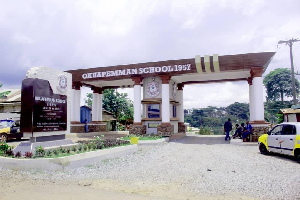- Home - News
- TWI News | TV
- Polls
- Year In Review
- News Archive
- Crime & Punishment
- Politics
- Regional
- Editorial
- Health
- Ghanaians Abroad
- Tabloid
- Africa
- Religion
- Election 2020
- Coronavirus
- News Videos | TV
- Photo Archives
- News Headlines
- Press Release
General News of Monday, 5 February 2007
Source: GNA
Gender Advisory Committee inaugurated
Accra, Feb. 5, GNA - Sheikh Ibrahim C. Quaye, Greater Accra Regional Minister, on Monday identified lack of education and poor training as some of the major contributing factors to low participation of women in decision-making.
He noted that despite their immense contribution to society, traditional biases continued to limit women's access to education, productive assets and decision-making roles in the family and public life.
Speaking at the inauguration of the Greater Accra Regional Gender Advisory Committee, he said while women had been dynamic in the pursuit of livelihoods, they had done so at very low levels involving arduous tasks characterised by very low rewards.
The 15-member Committee headed by the Deputy Greater Accra Regional Minister, Ms Theresa Ameley Tagoe is expected to bring stakeholders on gender issues together to assist in sharing expertise and working out programmes that would ensure gender mainstreaming to improve women involvement and engagement with local authorities at the level of Government.
The Regional Minister explained that it was to reverse the trend that the Government had directed the establishment of Gender Advisory Committees at workplaces as an effective institutional mechanism to mainstream gender issues in the national development agenda. He, therefore, charged the members to identify the polices that discriminated against women's empowerment in the region; advocate and advise for policy change that would improve the well-being of women and decrease inequity and poverty in the Region.
"This does not, however, mean that your focus should be on women only. It is likely that in your work, you may find in some areas where the role of men have been down played and a conscious policy to elevate the status of women over men with view to promoting gender equity" he said. The Regional Minister said he was hopeful for a society where opportunities existed equally to both sexes adding, "no one of them should have advantage over the other as a result of gender. School enrolment should be gender sensitive because education holds the key to national development. When we critically target our schools... we may be taking giant step forward ensuring gender parity in the near future". Ms Atawa Akyea, Director, Department of Women, Greater Accra Region explained that gender was not all about women but men, children and the vulnerable.
She noted that the Department was the implementing Agency of the mother Ministry and had the responsibility of translating its policies into activities demonstrating the commitment of the Government to achieving gender different concerns.
"While targeting disadvantaged groups and undertaking affirmative actions to correct past inequities, we should not lose sight of the focus and specialization of each stakeholder on the committee" she said.
The main responsibility of the Committee, she said, would be awareness creation to enhance appreciation of the need for a better, more equitable and higher quality delivery in the Region, with the option including social services such as education, health services, water and sanitation.
Ms Ameley Tagoe, Chairperson of the Committee, on behalf of her colleagues said they had taken the challenge to forward issues of gender in the Region.
She said it was her desire to establish a cr=E8che in the ministries area where nursing mothers could conveniently leave their children while they worked. 5 Feb. 07










